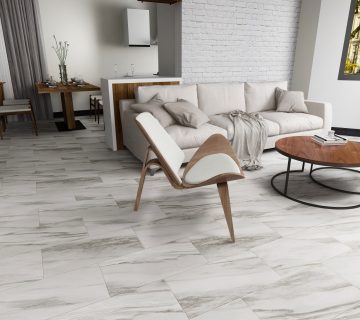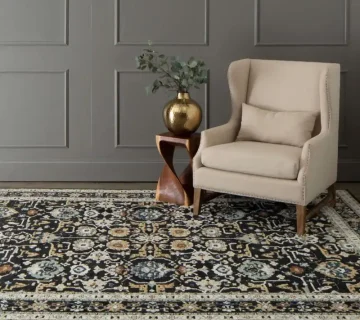Vinyl is the world’s second largest-selling plastic, and for good reason. Vinyl is low cost, high performance and versatile which makes it a top choice for many industries including communications, health care, aerospace; and of course home flooring. Statistics show that the production of vinyl flooring rose by 6.1% between 2011 and 2012, which would point to a significant rise in the demand for this kind of flooring. In addition to this, vinyl exports are up 1.9% in the past year alone, as well as vinyl continuing to edge out traditional wood to occupy 68% of the overall home applications market.
It is not just vinyl in general that has seen tremendous growth over the past decade or so. Vinyl plank flooring is now a top choice for many households in the United States and beyond, owing mainly to the low cost, durability and versatility of this type of flooring. Before settling on vinyl as your ultimate flooring option, it is first important to discover the benefits and problems with vinyl plank flooring. Like all other types of flooring, vinyl isn’t all together perfect. There are some downsides that would be worth looking at before making the all-important flooring decision.
The Advantages of Vinyl Plank Flooring
There are a number of notable advantages of vinyl plank flooring over other types of flooring. It is these advantages that have lead to the soaring popularity of vinyl for home flooring applications:
Cost Factor: Vinyl planks are created to mimic the look and feel of real wood, but cost only a fraction of the price. Telling the difference between vinyl and real wood flooring is difficult especially to the untrained eye, which means that homeowners can enjoy the aesthetics of real wood without breaking bank.
Grain Dimension: Vinyl plank flooring is also designed with a huge variety of wood grain sizes that would otherwise be difficult to find in traditional wood. You can simply choose the grain dimension that match your specific preference of solid wood and that is easily incorporated into the home’s decor. In addition to this, there are many different shades that mimic oak, maple, cherry and other types of wood. The design options here are literally limited to your imagination.
Durability: Vinyl flooring is one of the most durable types of flooring on the market; definitely more durable than real wood. This kind of flooring is great for high-traffic areas in the home, and is hardly susceptible to scratches, bumps and other defects as is common with real wood floors. In addition to this, the flooring is water resistant, meaning that it can be installed practically anywhere in the house including sensitive areas such as the kitchen or basement.
Installation: Vinyl plank flooring is some of the easiest flooring to install in any kind of space. Although it is recommended that you get an expert for the job, do-it-yourself enthusiasts with the appropriate knowledge and experience can easily install the flooring without the additional cost of calling in an expert. Installation can be done quickly, professionally and smoothly with little or no mess or wastage, which is more than can be said for hardwood flooring.
Comfort: Vinyl planks are comfortable underfoot and can be installed in high traffic areas. The planks also add an extra layer of insulation, making it a good option for additional sound proofing. The floor also doesn’t create noise underfoot as is the case with real wood floors.
Maintenance: Vinyl is extremely easy to maintain, and only needs a vacuum followed by mopping with a damp cloth or mop. The flooring also doesn’t easily stain, which makes it great for homes with pets and small children.
Refurbishing: A few touch-ups may be needed over time to restore the floor to its original condition. The advantage with vinyl planks is that they can be replaced easily and cheaply. You don’t have to take out the entire flooring to refurbish it, all you need to do is work on the problem areas and your floor will be back to its former glory.
The Disadvantages of Vinyl Plank Flooring
As with any other types of flooring available on the market, there are a few downsides to vinyl planks. No flooring is 100% perfect, which is why it is important to understand both the benefits and problems with vinyl plank flooring before making a decision:
Durability: Although vinyl is durable and able to withstand chips and warping, the floor is still susceptible to scratches. These can begin to show over time especially in high traffic areas, so a little extra care is needed to maintain the aesthetics for as long as possible.
Fading: Vinyl planks have also been known to fade over time especially when exposed to direct sunlight. This therefore makes it a bad choice for outdoor applications.
Installation: Because the vinyl isn’t nearly as solid as natural wood planks, a sub-floor will need to be installed before the actual vinyl planks.
Aesthetics: although vinyl does mimic the look of real solid wood, it is still vinyl. This is obvious especially to the trained eye, which can be a problem for some home owners.
Cleaning: You need to be careful when cleaning vinyl plank flooring as there are certain cleaners and solvents that may damage the floor. You want to use cleaners that have been manufactured to specifically cater for vinyl flooring.
Final Thought
It is extremely important to look at the benefits and problems with vinyl plank flooring. It is only after carefully considering both sides that you can be able to make an informed decision on whether or not this is the flooring for you.
Despite the downsides, vinyl planks are still an incredibly good option for home flooring applications. The disadvantages can easily be ignored given the many advantages of this type of flooring. The cost factor is the most important advantage, as not everyone is able to afford real solid wood floors especially given the current global economic situation.
It is important to explore other options before settling down on a single one. Flooring is crucial to the home’s aesthetics, and is one of the first things that people see when they walk into a home. That being said, a lot of forethought and consideration is needed when making this all-important decision.



